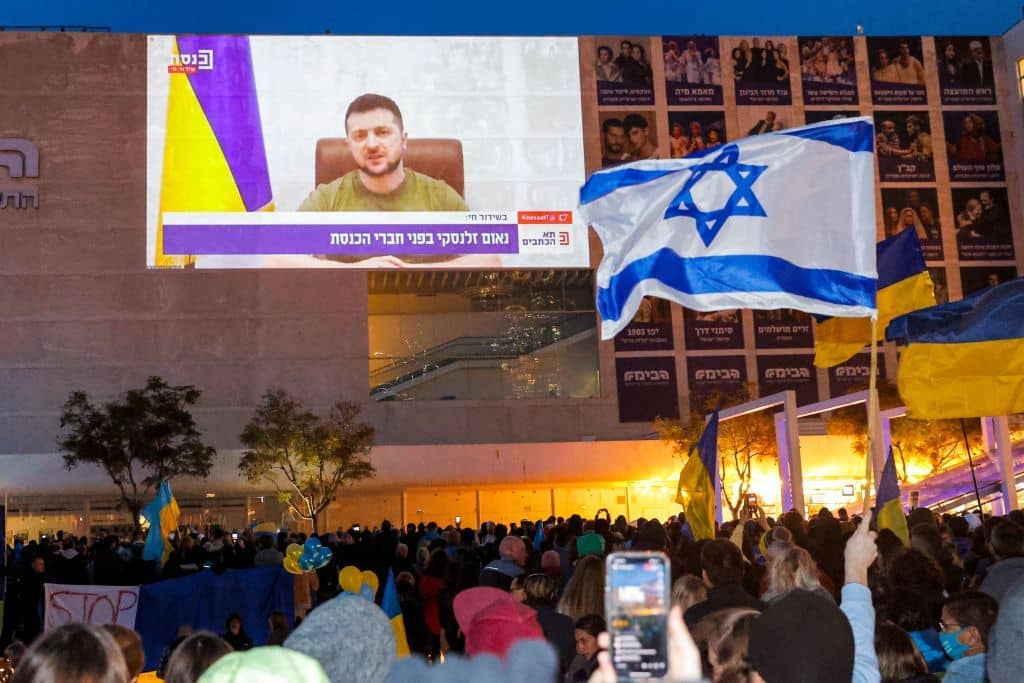Since Russia invaded Ukraine, there has been no shortage of historical analogies used to explain the conflict. From Stalinist terrors to the Cold War, Russian and Ukrainian leaders – and politicians from around the world – have sought to make links between the ongoing situation and historical points of reference. But Ukrainian prime minister Volodymyr Zelensky’s latest reference point – comparing the conflict to the Holocaust – is a step too far.
Last night, Zelensky pleaded with the Israeli Knesset to support Ukraine amidst. He was praised by some for his emotive speech, which Nachman Shai, the minister of diaspora affairs in Israel, described as heart-piercing. Other Israelis were far less sympathetic.
Zelensky is a brave man who deserves our respect
Zelensky made frequent references to events of the 1940s including the comparisons between ‘The Final Solution to the Jewish Question’ adopted at the Wannsee Conference in January 1942 and what he considers to be ‘The Final Solution’ adopted in the contemporary climate towards the Ukrainian people. Israeli communications minister Yoaz Hendel spoke for many when he said that while he ‘supports the Ukrainian people in heart and deed…comparison to the horrors of the Holocaust and the final solution is outrageous.’
Zelensky also made comparisons with the Ukrainian Righteous Among the Nations who saved Jews during the Holocaust, implying that the Israeli population could return the favour by saving Ukrainian during the ongoing war. There appears to be some distortion of what happened during the Holocaust at play here. While some Ukrainians responded to the Nazi invasion honourably, others did not. It has been well-documented that many Ukrainians collaborated with Nazis during the Holocaust on occupied Ukrainian territory, including in the devastating massacre at Babyn Yar. Former cabinet minister Yuval Steinitz, now a Likud MK, argued that: ‘The historic truth is that the Ukrainian people cannot be proud of its behaviour in the Holocaust of the Jews.’ Yet Zelensky’s remarks brush over such facts.
It is clear why Zelensky has drawn upon the Holocaust as an analogy for his country’s current crisis. In such adversity it is a striking vessel which frames Russia as indisputably evil, but which also demands further intervention from the international community lest they repeat the mistakes of the past. However, doing so, particularly in a speech to Israel, is plainly insensitive and ignores the ultimate uniqueness of the Holocaust as part of human history.
References to the Holocaust are frequently associated with support for more aggressive foreign policy and militancy, serving as a warning for the dangers of unchecked power and a desire not to repeat the mistakes of appeasement as with the Munich Agreement in 1934. The Holocaust has also been used as a justification for interventionism and has played a critical role in both decision-making and rallying the public behind intervention in the Gulf War, the Iraq War, Vietnam, and just about every genocide since the Convention was signed in 1951.
Yet all too often, analogies with the Holocaust – even if well intended to illustrate a particular point – are misguided. Back in 2019, one of the world’s leading Holocaust museums, the US Holocaust Memorial Museum, issued a statement announcing that it ‘unequivocally rejects efforts to create analogies between the Holocaust and other events, whether historical or contemporary.’
Zelensky is a brave man who deserves our respect. But his comparison between Ukraine’s current plight and the Holocaust is wrong.






Comments